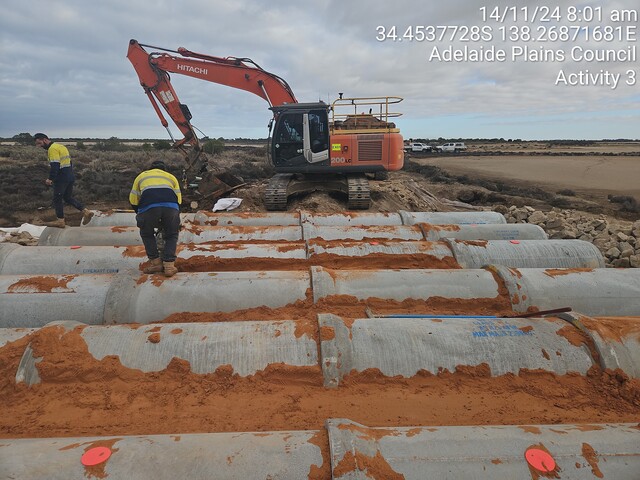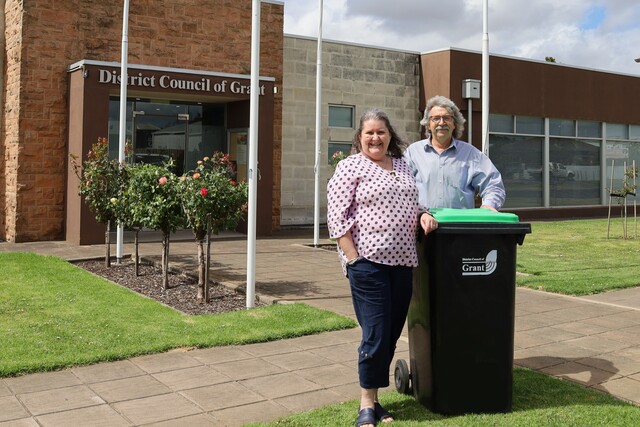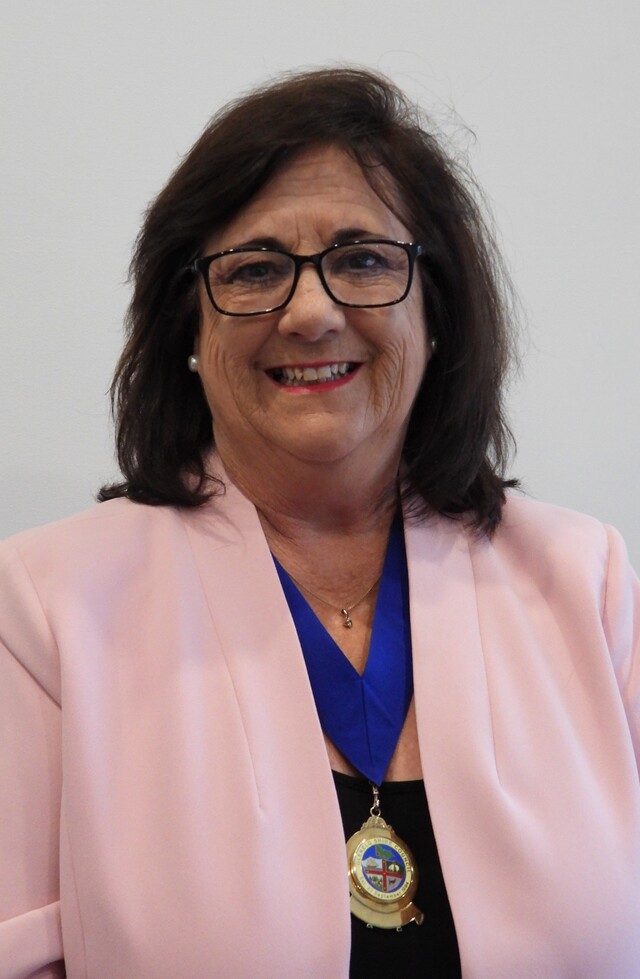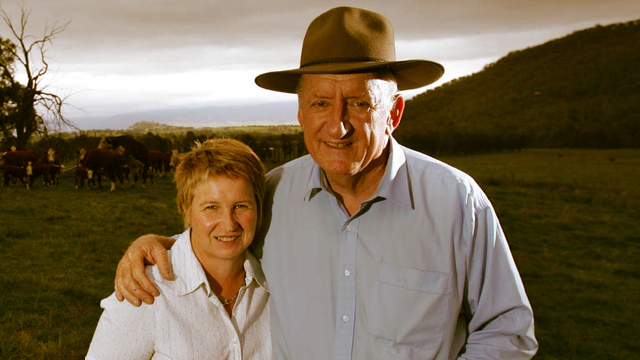Alderman Murray Stewart, Alice Springs Town Council, NT
Q. How long have you been on Council?
I was first elected in 2004 and am coming into my sixth year on Council.
In 2009, I was fortunate to represent the Town as Deputy Mayor and it was one of the most satisfying achievements
I have ever experienced. Knowing that my fellow councillors wanted me in the position was very humbling and filled me with pride. It is something I will never forget.
Q. Why did you become involved in Local Government?
After many years of hearing me whinge about the way various issues were handled, my family encouraged me to run for Council and have a go at achieving my own beliefs.
Q. What do you enjoy most about Alice Springs?
The pure ambience and atmosphere of the Alice is indescribable. While ambience is very much an individualised concept, being completely blind, for me it is all about the weather. I am always trying to keep physically fit, and the fact that I can take a walk almost any day of the year is fantastic.
In addition, Central Australia is an excellent place to bring up kids, due to its ease of access and ways to get around.
Q. You have competed in a number of national and international blind and vision impaired sporting events. Does this make sport and recreation a focus for you on Council?
It certainly does. I know what sport has done for me, both in developing skills to address challenges in business and working life, and providing opportunities to work in teams. Sport brings with it highs and lows, just like normal life, and it teaches us to adjust to life more than we often recognise.
I am part of Council’s Sports Committee, and I am committed to making myself available at every opportunity so that sporting organisations can share their issues. I am also committed to actively promoting sports issues and advocating for better facilities.
Q. What other issues are important to you?
Firstly, I think we need to place more focus on youth and guiding them into their adult lives, while also providing discipline and boundaries.
Secondly, we need to make life easier and more affordable for senior citizens. We must ensure that new subdivisions are planned with senior friendly housing in mind and we also need to look at partnerships with energy providers and other levels of government to introduce energy subsidies. The winters here can be extremely cold and the summers extremely hot, so we must make sure seniors can afford to be comfortable in these conditions.
Price parity is also important in terms of supermarkets. Our only major supermarket has locked Central Australia out of its pricing policy, which means that many products are more expensive here than in the rest of Australia. While this is apparently due to transport costs, we are no further from Adelaide than Mount Isa is from Brisbane, and yet they do not suffer the price increases we do here.
This month, I will be putting a proposal to Council to establish a Seniors’ Advisory Committee, which would include local seniors. The aim of this committee would be to both lobby on behalf of seniors, and action measures that would see more opportunities and services for seniors.
Q. What innovative projects is Council working on?
The Northern Territory is leading the way in the Cash for Cans recycling initiative. The project, which gives participants five cents in exchange for each can, aims to raise awareness of aluminium cans as a resource, encourage recycling and reduce the amount of can litter. Under the program, more than three million cans and bottles have been collected in eight months. This is an amazing result and it is fantastic to see this litter avoiding landfill and not getting smashed in the street.
Q. Tell us about a success you have had on Council.
There have been many things I am proud of, but none would have been possible without other people’s support and efforts. Above all, I do my best to be a strong voice for the average person, and I am known for my passion and vigour in whatever I bring to Council.
Having said that, I was particularly proud to be part of a Council team that was able to reform longstanding bylaws, which had remained untouched for decades. It was a challenge to make change, and we needed to consult with the community as much as possible to get us over the line. It was difficult and time consuming for all involved, but it was extremely satisfying.
Alderman Robyn Lesley, Darwin City Council, NT
Q. How long have you been on Council?
I’ve been involved in Local Government in one way or another since 1975, when, as a young activist, I stood for my first election. I wasn’t successful at that byelection, but was elected in 1978, 1982, 1996, 2000 and 2008.
From 1984 to 1993 I was a senior officer in the NT Office of Local Government.
In my current term, I have served as Deputy Lord Mayor and acting Lord Mayor.
Q. Why did you become involved in Local Government?
1975 was an amazing year and has been a catalyst for my life since. That year, we saw Darwin recovering from the immediate impact of Cyclone Tracey; I became the NT representative on the Federal Government’s Mid Decade of Women focus (part of the United Nation’s declared decade for women in 1970, this was aimed at encouraging women around the nation to come together and review where we were at and where we were going); and my daughter was born.
In 1978 when I was first elected, the focus was understandably on infrastructure development post Cyclone Tracey. However, my focus was on community development and recognising that Council had a special opportunity in the rebuilding of Darwin to respond to the wider needs of the community, and particularly to recognise the changing needs of women and children.
Every decade since has brought new challenges, however the core driver for me remains responsiveness to the needs of the wider community and change to reflect the times.
Q. What makes your Council area special?
Darwin has two key elements that contribute to it being a very special place. Firstly, its natural beauty. Positioned on a peninsula surrounded by water and bathed in sun every day, the air is clear, the drinking water is sweet and the people are open, multicultural and interesting. Secondly, we are remote and closer to Southeast Asia than the major centres of Australia.
As a consequence, Darwin over the decades has had to develop the ability to thrive, while surviving the first attack on Australian soil by a foreign power since Federation – the bombing of Darwin on 19 February 1942, the annual wet season and occasional damaging cyclones, and regular changes in political and bureaucratic control.
Consequently, if you want to ‘have a go’ and be successful, Darwin is the place to do it.
Q. Tell us about this year’s bombing of Darwin commemorations.
Each year, Darwin City Council prepares for a formal ceremony at the Cenotaph on the Esplanade, not far from the spot where Japanese fighter planes dropped bombs on the wharf and many military and civilian sites around the city.
This year, the 68th anniversary, we will again welcome back many of the veterans and their families who were here in 1942. This year and next are, however, a prelude to the 70th anniversary commemorations, where Darwin will play host to our veterans, as well as many visitors from around the world who shared in the experience of the Japanese military campaign that started at Pearl Harbour, Honolulu on 7 December 1941, progressed across the Pacific to the Philippines and ended up in Darwin, Australia on 19 February 1942.
2012 will be a very special year. It promises to showcase a very important part of our Australian history and it will show our remaining veterans that we remember and that the event will continue into another generation.
Q. What has been your greatest achievement on Council?
Over the years, I have obtained Federal funding for six community based childcare centres in Darwin, I contributed to the acquisition of major parcels of land in the early 1980s for future multistorey car parking within the CBD, and introduced swimming pool fencing.
However, the reputation for caring about my community and the pride that my family has for the work I do (even when they sometimes think I am crazy) is what keeps me going day in and day out.







